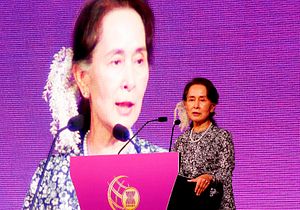In November 2015, Myanmar’s civilian government and leader Aung San Suu Kyi took office after her party, the National League for Democracy (NLD), swept the general election. People in Myanmar widely celebrated the birth of the country’s first democratically elected, civilian-led government in half a century by holding NLD flags and portraits of the leader they call “The Lady.” The United States responded by lifting economic and financial sanctions after Aung San Suu Kyi’s first official visit to the White House in September 2016.
Three years later, there is rising concern that Nobel Peace Prize laureate Aung San Suu Kyi and her government have lost its sheen. Many have condemned her government’s handling of an ethnic crisis that led to mass killings and the exodus of more than 700,000 Rohingya Muslims from her country.
Domestically, she has lost support from ethnic groups, civil society leaders, and media; key stakeholders who once were avid followers. Internationally, she has lost credibility and support from democratic countries, including the United States. And recently, Amnesty International revoked its highest honor from her, the 2009 Ambassador of Conscience Award. Her once well-respected leadership is at stake, and more importantly, so is Myanmar’s infant democracy. While Aung San Suu Kyi cannot resolve these problems alone, her unique authority gives her the opportunity to get Myanmar back on track.
Aung San Suu Kyi and the NLD must start by easing religious and ethnic tensions. The protection of vulnerable and minority populations is a fundamental tenet of democracy. It cannot be achieved without ending violence against minorities. Myanmar has over 135 distinct ethnic groups, and protecting and respecting each of them should be a key priority, particularly the Rohingya who have long been subjected to discrimination and isolation. However, the NLD’s mishandling of the ongoing ethnic crises and violence in Rakhine, Kachin, and Shan states attest to the significant challenges that persist.
According to a countrywide survey supported by National Democratic Institute, an alarming 49 percent of Myanmar’s citizens believe the state of armed conflict in ethnic areas under the current government has worsened or stayed the same compared to the previous military-led government. Dissatisfaction with the peace building process was also demonstrated in recent election results — the NLD lost five out of six seats in the ethnic regions.
Aung San Suu Kyi could use her platform to emphasize the importance of celebrating diversity and promoting social harmony, rather than stoking the flames of prejudice with rhetoric against ethnic groups.
One way to accomplish this is strengthening the freedom of the media. Free press is a pillar of democracy. Yet the “free press” in Myanmar is suppressed, as evidenced by the harsh penalties reporters have endured. Earlier this year, two Burmese Reuters journalists were sentenced to seven-year prison terms for investigating the military’s actions against the Rohingya. Just last month, three journalists were arrested after reporting critically on the financial management of the Yangon municipal budget.
To demonstrate their commitment to democracy, Aung San Suu Kyi and the government should guarantee greater freedom of the press. The government can start by reviewing and amending laws such as the Official Secrets Act that used to unlawfully restrict the right to freedom of press and expression.
Aung San Suu Kyi should also look to the country’s youth; it can be her greatest asset in rebuilding Myanmar’s fragile democracy. Communication channels need to be opened and she should work with Myanmar’s youth, who stand for a common vision of a free and prosperous Myanmar. She should ensure young leaders in Myanmar are prepared to be tomorrow’s political and civil society leaders.
I know firsthand Burmese trailblazers who are effecting change. Through the George W. Bush Institute Liberty and Leadership program, we help train former political prisoners, members of Parliament, journalists, educators, health practitioners, and teachers fighting for their freedoms. They represent the rich ethnic and religious diversity of the country and people like them can be an incredible asset to Aung San Suu Kyi.
Aung San Suu Kyi has the unique ability to lead her colleagues and country away from repression, economic struggle, and international isolation. By showing commitment to easing religious and ethnic tension, strengthening freedoms of the media, and working with the country’s next generation of democratic leaders, the NLD can gain back wide-ranging domestic support in the 2020 election. There is still hope for Myanmar and Aung San Suu Kyi has an opportunity to course correct.
Jieun Pyun is manager of the George W. Bush Institute’s Human Freedom Initiative.

































